Behind Apple's 'insult' of China
A photo on Apple's customer service webpage sparked controversy in China by featuring a person with "stereotypical" Chinese looks, with slit eyes and a long braid, coming under fire for "uglifying" Chinese people. While aesthetic preferences do differ, is there something deeper under the criticism of a stranger's looks?
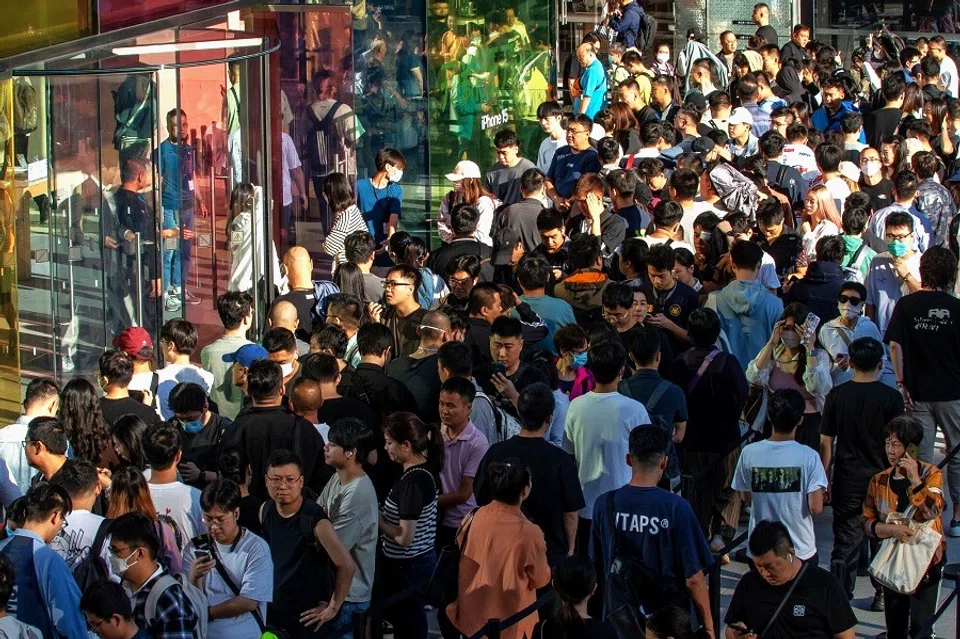
Just days after American tech giant Apple released its new flagship iPhone 15 series on 15 September, a photograph of one of its customer service employees went viral.
The photograph on Apple Watch's customer service webpage features an Apple Watch specialist sporting a long black braid or pigtail.
The photograph made its rounds on Chinese social media platforms on 16 September and immediately went viral. Nobody knew who the employee was, but many Chinese netizens commented that the image made them uncomfortable, and criticisms of the company sent Apple to Weibo's top search list at one point.
These netizens said the employee checked all the boxes of a stereotypical Chinese - wide-set slit eyes, garlic-shaped nose, a mole near the mouth reminiscent of a legal adviser (师爷) in imperial China, Mongolian face shape, and a pigtail - and were convinced that Apple was engaging in petty moves and intentionally targeting and "uglifying" the Chinese.
Asian or Native American?
Even as some netizens were still wagging their fingers at this unidentified person, tech.ifeng.com on 17 September quoted sources as saying that the person is in fact a Native American employee with Apple.
The photograph isn't just on Apple's official website in China either - it is also used in the US, Japan, South Korea and other regions.
...the photograph was of a female employee working at Apple's headquarters in California.
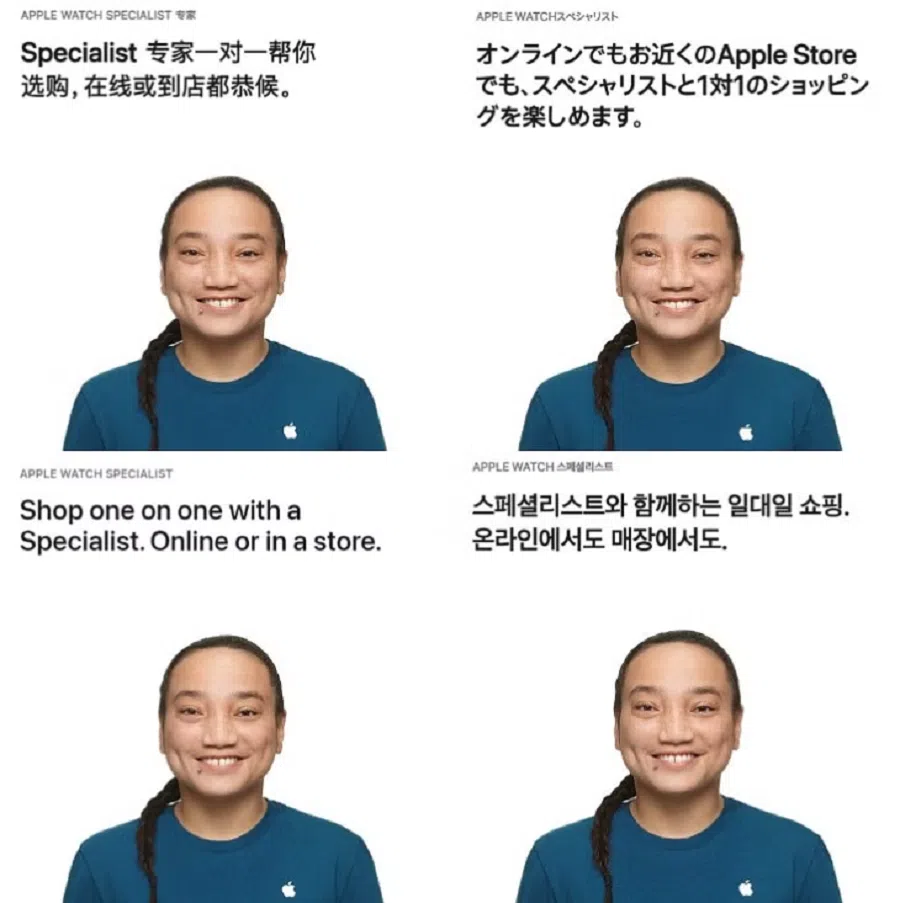
On 18 September, Cailian Press (财联社) found out from Apple that the photograph was of a female employee working at Apple's headquarters in California.
Some netizens think since Apple did not say the person in the photograph was Chinese and the image did not just appear on its China site, there was no need to elevate the issue to a matter of principle or even deliberately attack someone's appearance, which is bad form.
Other netizens think this "insult to China" reflects the "narrow-minded nationalism" of the Chinese people, and sarcastically said that although it has been more than a century since Chinese people cut off their braids, "they have not yet cut the braid (inferiority complex) in their heart".
"... As a Chinese consumer now, why should I be allowed to look at a site that is suspected of showing me 'slit eyes' and a 'pigtail' and not be allowed to say anything?" - Han Peng, US correspondent, CGTN
However, the wave of criticism within China did not subside. On 18 September, CGTN's US correspondent Han Peng wrote on Weibo that China should certainly speak out if it feels uncomfortable about something, because "if you don't talk about racism in the US, they will just pretend it doesn't exist".
He added, "The US demands so much from me, and talks about political correctness and elevates issues to a matter of principle time after time. As a Chinese consumer now, why should I be allowed to look at a site that is suspected of showing me 'slit eyes' and a 'pigtail' and not be allowed to say anything?"
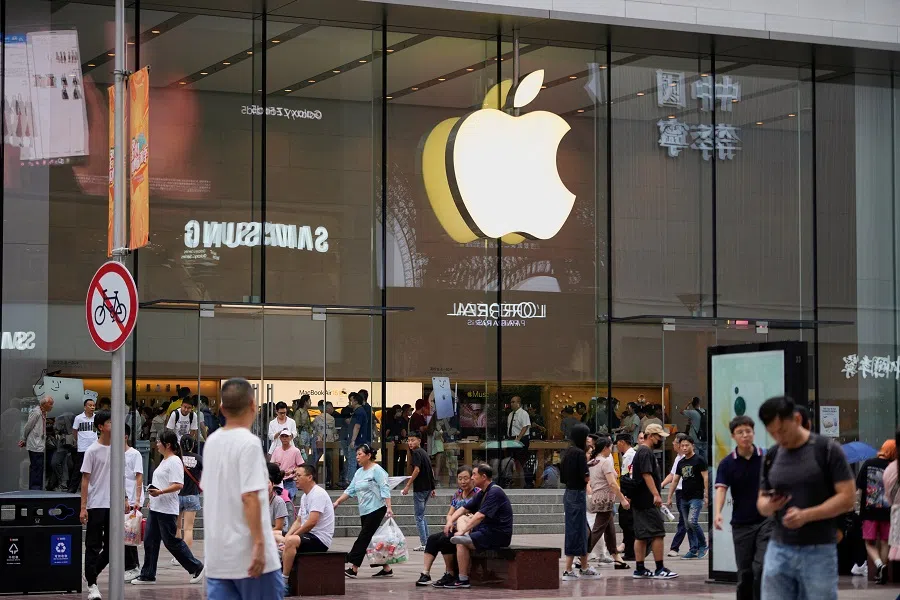
A netizen (地瓜熊老六) also wrote: "Truth be told, putting aside the fact that she is a Native American, even if she is American... she just makes me feel uncomfortable and upset! I hope Apple can consider my feelings."
On the other hand, former editor-in-chief of Global Times Hu Xijin urged netizens to keep a clear head, saying, "When faced with situations that are ambiguous and may be open to multiple interpretations, we need to let reason prevail and adopt a positive attitude towards communication."
However, Hu also thinks that multinational corporations should be more careful in their publicity efforts and try to avoid using content that may cause misunderstandings among the Chinese.
... about 123,000 netizens think that it does make them "uncomfortable", while only 59,000 netizens feel there is "nothing wrong".
On 17 September, Pear Video (梨视频) conducted a poll on Weibo asking netizens what they felt about the image. As of 19 September afternoon, about 123,000 netizens think that it does make them "uncomfortable", while only 59,000 netizens feel there is "nothing wrong".
As the saga escalated, Apple customer support responded on 18 September that it has received the feedback and takes the issue seriously, and will post a statement on its official website later. But as of 21 September, apart from the news that Cailian Press reported, Apple has yet to confirm if the person in the photo is really an Apple employee and if she is Native American.
Slit eyes a taboo in China?
There is more than one standard for beauty, and it is difficult to have common criteria, as beauty is in the eye of the beholder.
However, over the past few years, many international brands or even Chinese brands themselves have been accused of "insulting" China for using publicity materials or advertisements featuring slit eyes.
It seems that the Chinese have quite a common aesthetic viewpoint: "slit eyes" are ugly, and using models with "slit eyes" to represent China is to uglify the Chinese.
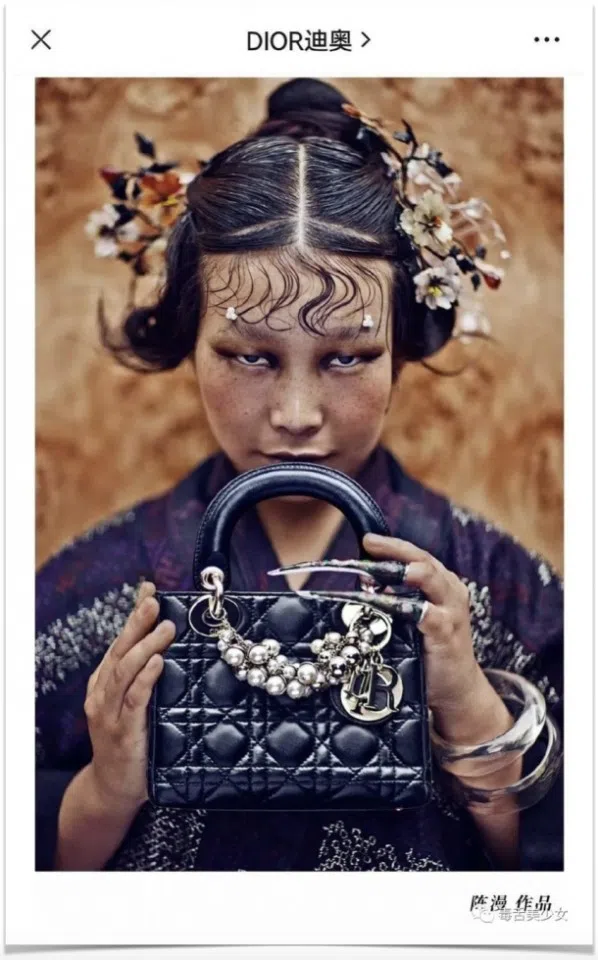
In November 2021, French luxury brand Dior displayed a picture of an Asian-looking female model in Shanghai. The female model's freckled face, with an exaggerated bun coupled with thick eyeshadow makeup over "slit eyes" and wearing black Qing-dynasty nail armour on two of her fingers, was accused of "uglifying Chinese women".
That same year, Chinese online snack brand Three Squirrels released a publicity poster for their food products featuring a model with "slit eyes" makeup, and was likewise criticised for "intentionally pandering to the Western aesthetics of uglifying the Chinese."
It seems that the Chinese have quite a common aesthetic viewpoint: "slit eyes" are ugly, and using models with "slit eyes" to represent China is to uglify the Chinese.
Apple drawn into China-US tech war?
On top of violating the aesthetic taboo of Chinese netizens, Apple might have also been drawn into the China-US tech war.
The release of the Mate 60 Pro smartphone by Chinese communications giant Huawei in late August, which it claims is equipped with a domestically-produced 7-nanometre chip, has led many to believe that China has broken through the US tech blockade.
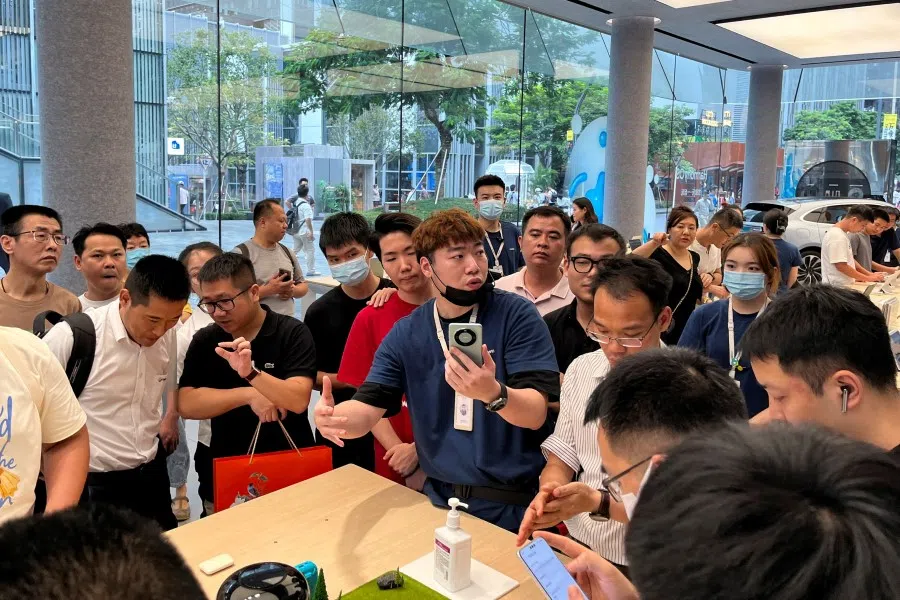
Huawei's new phone has stirred patriotism among Chinese consumers, and put pressure on competitor Apple which released its new iPhone two weeks after. On 9 September, Caijing called a poll on Weibo asking netizens if they would switch from an iPhone to Huawei, and 43% of the 13,000 participants said yes.
But the challenge for Apple is not just the inherent loss of consumers from the Chinese market, but also the negative impression the Chinese market has towards the brand.
In the past week on Chinese social media platforms such as Weibo and Zhihu, there has been a constant stream of negative news surrounding the iPhone. A netizen who claims to be an expert in the communications industry raised doubts stating that the iPhone fakes its 5G signal. The netizen claimed that while travelling on Line 10 of the Beijing Subway, the iPhone showed a 5G signal even though the area the netizen was in did not yet have a 5G network.
Chinese actor Liu Jin also posted a video on 17 September lambasting Apple's after-sales service, saying the motherboard of his iPhone 13 Pro Max was faulty, and he hoped to send it back to the Apple factory for repairs. But Apple's customer service said Liu's phone had undergone "unauthorised modification" and asked Liu to pay a repair fee of 6,960 RMB (US$952).
Despite Liu reiterating that he bought his iPhone from an Apple authorised dealer and that he did not modify his phone, Apple insisted that Liu's phone had been tampered with. Liu, dissatisfied with Apple's one-sided judgement, went to the Apple store in Wangfujing, Beijing and smashed his phone at the storefront, proclaiming that he will never buy an Apple product ever again.
...the first batch of iPhone 15 Pro and the iPhone 15 Pro Max on the official Apple flagship store on Tmall sold out within one minute...
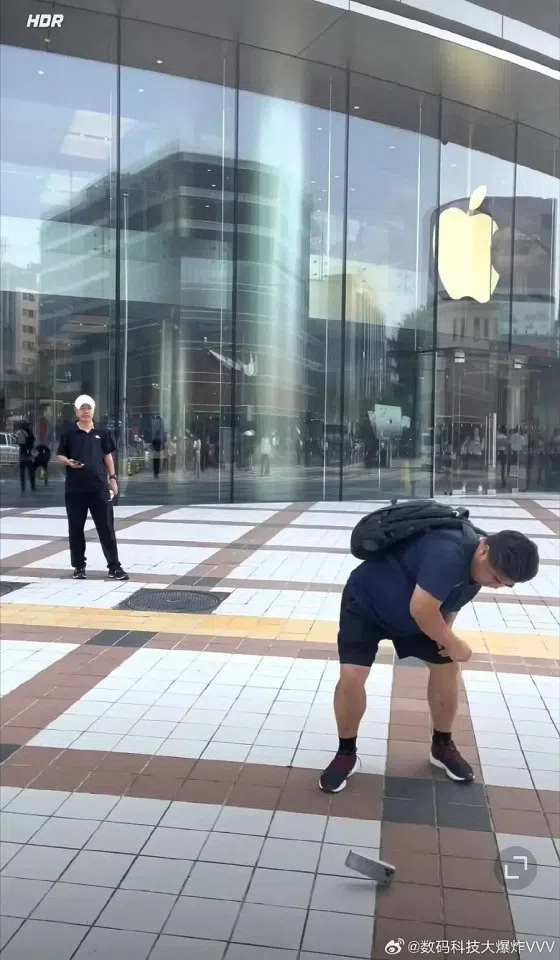
The iPhone-smashing and the "insulting" picture of the Apple customer service officer both made the top of the list of top searches on Weibo on the same day. However, netizens were quick to note that subsequent Weibo posts from Liu Jin still show that they were sent from an iPhone. Liu's live streaming platform followers also increased rapidly, leading many to believe that the incident might have been Liu "showboating for views".
Yet in spite of the negativity, it seems that sales of Apple's new iPhone in China have not been affected much.
Cailian Press reported that within ten minutes of the opening of pre-orders for the iPhone 15 series on 15 September, the official Apple website crashed at one point; the first batch of iPhone 15 Pro and the iPhone 15 Pro Max on the official Apple flagship store on Tmall sold out within one minute; statistics from the JD platform showed that as of Monday, there were over 3 million pre-orders for the iPhone 15 series, with certain configurations only available for collection in November.
Perhaps the best approach for Apple, which relies heavily on the Chinese market, might be to quietly wait out the storm. As for the Native American employee - who is simply a product specialist, not a brand ambassador - at the heart of this controversy, for her to be unable to defend herself even as her looks are being picked apart and criticised by a host of Chinese netizens, it is truly an unexpected ordeal.
An online comment said it is perfectly normal for people to have different aesthetic preferences, but to maliciously attack others on the basis of their looks is just bad form - the ugliness reflected in this incident does not lie in so-called "slit eyes".
This article was first published in Lianhe Zaobao as "苹果"辱华"风波的背后".





